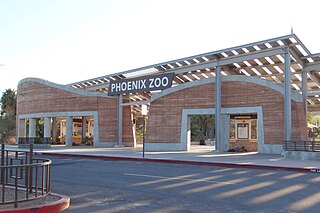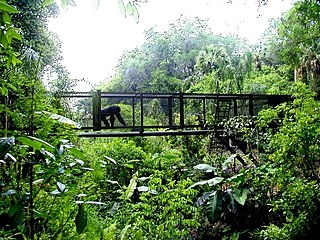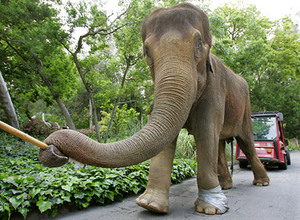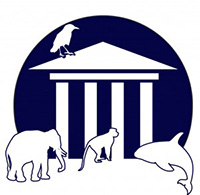
Cheeta is a chimpanzee character that appeared in numerous Hollywood Tarzan films of the 1930s–1960s, as well as the 1966–1968 television series, as the ape sidekick of the title character, Tarzan. Cheeta has usually been characterized as male, but sometimes as female, and has been portrayed by chimpanzees of both sexes.

Twycross Zoo is a medium to large zoo near Norton Juxta Twycross, Leicestershire. The zoo has the largest collection of monkeys and apes in the Western World, and in 2006 re-launched itself as "Twycross Zoo – The World Primate Centre".

The Houston Zoo is a 55-acre (22 ha) zoological park located within Hermann Park in Houston, Texas, United States. The zoo houses over 6,000 animals from more than 900 species. It receives around 2 million visitors each year and is the second most visited zoo in the United States, surpassed only by the San Diego Zoo. It is accredited by the Association of Zoos and Aquariums (AZA).

Oliver was a former "performing" chimpanzee once promoted as a missing link or "humanzee" due to his somewhat human-like appearance and a tendency to walk upright. Despite his somewhat unusual appearance and behavior, scientists found that Oliver was not a human-chimpanzee hybrid.

The Los Angeles Zoo and Botanical Gardens is a 133-acre (54 ha) zoo founded in 1966 and located in Los Angeles, California, United States. The city of Los Angeles owns the zoo, its land and facilities, and the animals.

Blackpool Zoo is a 32-acre (13 ha) zoo, owned by Parques Reunidos and located in the sea-side resort of Blackpool, Lancashire, England. It cares for over 1,000 animals from all over the world.

The Phoenix Zoo opened in 1962 and is the largest privately owned nonprofit zoo in the United States. Located in Phoenix, Arizona, the zoo was founded by Robert Maytag, a member of the Maytag family, and operates on 125 acres (51 ha) of land in the Papago Park area of Phoenix. It has been designated as a Phoenix Point of Pride.

Animal-made art consists of works by non-human animals, that have been considered by humans to be artistic, including visual works, music, photography, and videography. Some of these are created naturally by animals, often as courtship displays, while others are created with human involvement.
The International Primate Protection League (IPPL) is a not-for-profit animal welfare organization founded in 1973 in Thailand by Shirley McGreal.

Experiments involving non-human primates (NHPs) include toxicity testing for medical and non-medical substances; studies of infectious disease, such as HIV and hepatitis; neurological studies; behavior and cognition; reproduction; genetics; and xenotransplantation. Around 65,000 NHPs are used every year in the United States, and around 7,000 across the European Union. Most are purpose-bred, while some are caught in the wild.

Animal Defenders International (ADI), founded 1990, has offices in US, UK, Colombia, Peru and South Africa; it actuates education and public awareness campaigns to protect animals in captivity and wild animals and their environments. ADI 's campaigns focus on animals used in entertainment, sport, for clothing; illegal wildlife trade; and replacement of animals used in research and testing. ADI collaborates with governments on large-scale international rescues of wild animals following legislation to end animal circuses, illegal animal trafficking. ADI owns and operates the ADI Wildlife Sanctuary, South Africa, home to nearly 40 ex-circus lions and tigers from Peru, Colombia and Guatemala.
Save the Chimps, Inc is a 501(c)(3) nonprofit American sanctuary specializing in the care of chimpanzees. The organization was founded by Carole C. Noon in 1997 with support from Jon Stryker of the Arcus Foundation. Save the Chimps is accredited by the Global Federation of Animal Sanctuaries (GFAS) and a founding member of the North American Primate Sanctuary Alliance. The mission of Save the Chimps is to provide sanctuary and exemplary care to chimpanzees in need.
Jiggs was a male chimpanzee and animal actor who originated the character of Cheeta in the 1930s Hollywood Tarzan movies. He was owned and trained by Tony and Jacqueline Gentry.

The Center for Great Apes is an animal sanctuary for great apes located east of Wauchula, Florida. Founded as a nonprofit organization in 1993, the sanctuary has about 70 orangutans and chimpanzees who were formally used in entertainment, scientific research, or the exotic pet trade. The sanctuary sits on 100 acres of land in rural Florida, southwest of Orlando.

Gita was a 48-year-old Asian elephant who died at the Los Angeles Zoo on June 10, 2006. Gita's death prompted dozens of animal rights activists, including In Defense of Animals, to accuse the zoo of neglecting and endangering its animals by placing them in unsatisfactory living conditions, and fueled a years-long debate in the city government over the ethics of keeping elephants in a zoo at all.

The Chimpanzee tea party was a form of public entertainment in which chimpanzees were dressed in human clothes and provided with a table of food and drink.
The Primate Rescue Center is a primate rescue organization founded by Clay Miller and April Truitt in the late 1980s. The PRC is a 501(c)(3) nonprofit organization located in Wilmore, Kentucky, United States, approximately 17 miles south of Lexington, Kentucky. The PRC provides lifetime sanctuary for rescued primates from all over the United States, and is home to over 50 primates, including a troop of 11 common chimpanzees.

The Nonhuman Rights Project (NhRP) is an American nonprofit animal rights organization seeking to change the legal status of at least some nonhuman animals from that of property to that of persons, with a goal of securing rights to bodily liberty and bodily integrity. The organization works largely through state-by-state litigation in what it determines to be the most appropriate common law jurisdictions and bases its arguments on existing scientific evidence concerning self-awareness and autonomy in nonhuman animals. Its sustained strategic litigation campaign has been developed primarily by a team of attorneys, legal experts, and volunteer law students who have conducted extensive research into relevant legal precedents. The NhRP filed its first lawsuits in December 2013 on behalf of four chimpanzees held in captivity in New York State. In late 2014, NhRP President Steven Wise and Executive Director Natalie Prosin announced in the Global Journal of Animal Law that the Nonhuman Rights Project was expanding its work into other countries, beginning in Switzerland, Argentina, England, Spain, Portugal, and Australia.
International Primate Day, September 1, is an annual educational observance event organized since 2005 largely by British-based Animal Defenders International (ADI) and supported annually by various primate-oriented advocacy organizations, speaks for all higher and lower primates, typically endorsing humane agendas where primates are at risk, as in research institutions or species endangerment in precarious environmental situations.














